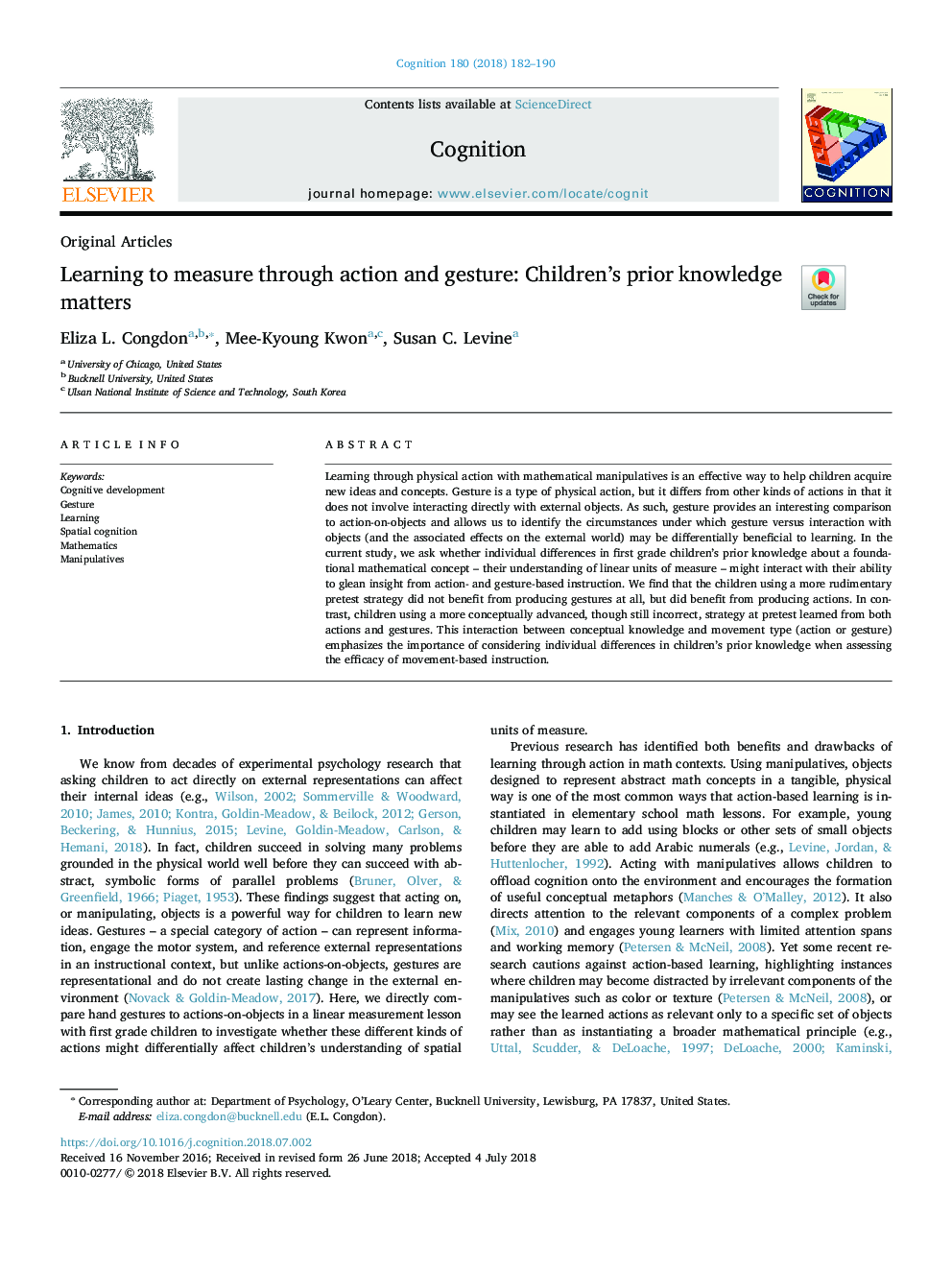| کد مقاله | کد نشریه | سال انتشار | مقاله انگلیسی | نسخه تمام متن |
|---|---|---|---|---|
| 7285062 | 1474087 | 2018 | 9 صفحه PDF | دانلود رایگان |
عنوان انگلیسی مقاله ISI
Learning to measure through action and gesture: Children's prior knowledge matters
ترجمه فارسی عنوان
یادگیری از طریق عمل و حرکات سنجش: دانش قبلی دانش آموزان مهم است
دانلود مقاله + سفارش ترجمه
دانلود مقاله ISI انگلیسی
رایگان برای ایرانیان
کلمات کلیدی
توسعه شناختی، ژست، یادگیری، شناخت فضایی، ریاضیات، مانیتور،
ترجمه چکیده
یادگیری از طریق اقدام فیزیکی با دستکاری ریاضی یک راه موثر برای کمک به کودکان در دستیابی به ایده ها و مفاهیم جدید است. ژست یک نوع فعالیت فیزیکی است، اما از انواع دیگر اقدامات متفاوت است، به این معنی که ارتباط مستقیمی با اشیاء خارجی ندارد. به همین ترتیب، ژست یک مقایسه جالبی را با عمل-روی-اشیا فراهم می کند و به ما امکان می دهد تا شرایطی را مشخص کنیم که در آن ژست در مقابل تعامل با اشیاء (و اثرات مرتبط با آن در جهان خارج) ممکن است متفاوت از یادگیری باشد. در مطالعه حاضر، خواهیم پرسید که آیا تفاوت های فردی در دانش قبلی دانش آموزان در مورد یک مفهوم ریاضی پایه - درک آنها از واحدهای خطی اندازه گیری - ممکن است با توانایی آنها برای درک بینش از دستورالعمل مبتنی بر عمل و ژست تعامل داشته باشد. ما دریافتیم که کودکان با استفاده از استراتژی پیشآمدهای ابتدایی، از تولید حرکات سود نبردند، اما از اقدامات تولید سود بردند. در مقابل، کودکان با استفاده از استراتژی مفهومی پیشرفته، هر چند هنوز نادرست در پیش آزمون، از هر دو اقدام و حرکات یاد گرفته شده است. این تعامل بین دانش مفهومی و نوع جنبش (عمل یا ژست) بر اهمیت بررسی تفاوتهای فردی در دانش قبلی دانش آموزان در هنگام ارزیابی اثربخشی آموزش مبتنی بر حرکت تاکید می کند.
موضوعات مرتبط
علوم زیستی و بیوفناوری
علم عصب شناسی
علوم اعصاب شناختی
چکیده انگلیسی
Learning through physical action with mathematical manipulatives is an effective way to help children acquire new ideas and concepts. Gesture is a type of physical action, but it differs from other kinds of actions in that it does not involve interacting directly with external objects. As such, gesture provides an interesting comparison to action-on-objects and allows us to identify the circumstances under which gesture versus interaction with objects (and the associated effects on the external world) may be differentially beneficial to learning. In the current study, we ask whether individual differences in first grade children's prior knowledge about a foundational mathematical concept - their understanding of linear units of measure - might interact with their ability to glean insight from action- and gesture-based instruction. We find that the children using a more rudimentary pretest strategy did not benefit from producing gestures at all, but did benefit from producing actions. In contrast, children using a more conceptually advanced, though still incorrect, strategy at pretest learned from both actions and gestures. This interaction between conceptual knowledge and movement type (action or gesture) emphasizes the importance of considering individual differences in children's prior knowledge when assessing the efficacy of movement-based instruction.
ناشر
Database: Elsevier - ScienceDirect (ساینس دایرکت)
Journal: Cognition - Volume 180, November 2018, Pages 182-190
Journal: Cognition - Volume 180, November 2018, Pages 182-190
نویسندگان
Eliza L. Congdon, Mee-Kyoung Kwon, Susan C. Levine,
